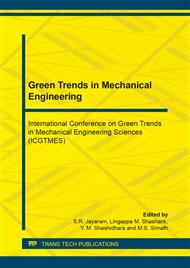[1]
Reeves CJ, Menezes PL, Jen TC, Lovell MR. The influence of fatty acids on tribological and thermal properties of natural oils as sustainable bio-lubricants. Tribology International. 2015 Oct 1; 90: 123-34.
DOI: 10.1016/j.triboint.2015.04.021
Google Scholar
[2]
Murakami T, Mano H, Hibi Y, Matsuzaki K, Inui H. Friction and wear properties of Fe7Mo6-and αFeSi2-based alloys in rapeseed oil. Tribology International. 2012 Dec 1; 56:1-8.
DOI: 10.1016/j.triboint.2012.06.017
Google Scholar
[3]
Lawal SA, Choudhury IA, Nukman Y. Evaluation of vegetable and mineral oil-in-water emulsion cutting fluids in turning AISI 4340 steel with coated carbide tools. Journal of cleaner production. 2014 Mar 1;66:610-8.
DOI: 10.1016/j.jclepro.2013.11.066
Google Scholar
[4]
Talib N, Rahim EA. The effect of tribology behavior on machining performances when using bio-based lubricant as a sustainable metalworking fluid. Procedia CIRP. 2016 Jan 1; 40:504-8.
DOI: 10.1016/j.procir.2016.01.116
Google Scholar
[5]
Ing TC, Rafiq AK, Azli Y, Syahrullail S. Tribological behaviour of refined bleached and deodorized palm olein in different loads using a four-ball tribotester. Scientia Iranica. 2012 Dec 1;19(6):1487-92.
DOI: 10.1016/j.scient.2012.10.027
Google Scholar
[6]
Ruggiero A, D'Amato R, Merola M, Valášek P, Müller M. On the tribological performance of vegetal lubricants: Experimental investigation on Jatropha Curcas L. oil. Procedia Engineering. 2016 Jan 1;149:431-7.
DOI: 10.1016/j.proeng.2016.06.689
Google Scholar
[7]
Talib N, Rahim EA. Performance Evaluation of Chemically Modified Crude Jatropha Oil as a Bio-Based Metalworking Fluids for Machining Process. Procedia CIRP, 26, 346-350.
DOI: 10.1016/j.procir.2014.07.155
Google Scholar
[8]
Agrawal SM, Lahane S, Patil NG, Brahmankar PK. Experimental investigations into wear characteristics of M2 steel using cotton seed oil. Procedia Engineering. 2014 Jan 1;97:4-14.
DOI: 10.1016/j.proeng.2014.12.218
Google Scholar
[9]
Syahrullail S, Kamitani S, Shakirin A. Performance of vegetable oil as lubricant in extreme pressure condition. Procedia Engineering. 2013 Jan 1;68:172-7.
DOI: 10.1016/j.proeng.2013.12.164
Google Scholar
[10]
Alves SM, Barros BS, Trajano MF, Ribeiro KS, Moura E. Tribological behavior of vegetable oil-based lubricants with nanoparticles of oxides in boundary lubrication conditions. Tribology International. 2013 Sep 1; 65:28-36.
DOI: 10.1016/j.triboint.2013.03.027
Google Scholar
[11]
Quinchia LA, Delgado MA, Reddyhoff T, Gallegos C, Spikes HA. Tribological studies of potential vegetable oil-based lubricants containing environmentally friendly viscosity modifiers. Tribology International. 2014 Jan 1; 69:110-7.
DOI: 10.1016/j.triboint.2013.08.016
Google Scholar
[12]
Martín-Alfonso JE, Valencia C. Tribological, rheological, and microstructural characterization of oleogels based on EVA copolymer and vegetables oils for lubricant applications. Tribology International. 2015 Oct 1; 90: 426-34.
DOI: 10.1016/j.triboint.2015.05.004
Google Scholar
[13]
Huang W, Hou B, Zhang P, Dong J. Tribological performance and action mechanism of S-[2-(acetamido) thiazol-1-yl] dialkyl dithiocarbamate as additive in rapeseed oil. Wear. 2004 Jun 1;256(11-12):1106-13.
DOI: 10.1016/s0043-1648(03)00532-5
Google Scholar
[14]
Koshy CP, Rajendrakumar PK, Thottackkad MV. Evaluation of the tribological and thermo-physical properties of coconut oil added with MoS2 nanoparticles at elevated temperatures. Wear. 2015 May 1; 330:288-308.
DOI: 10.1016/j.wear.2014.12.044
Google Scholar
[15]
Adhvaryu A, Erhan SZ, Perez JM. Tribological studies of thermally and chemically modified vegetable oils for use as environmentally friendly lubricants. Wear. 2004 Aug 1;257(3-4):359-67.
DOI: 10.1016/j.wear.2004.01.005
Google Scholar
[16]
Jayadas NH, Nair KP, Ajithkumar G. Tribological evaluation of coconut oil as an environment-friendly lubricant. Tribology International. 2007 Feb 1;40(2):350-4.
DOI: 10.1016/j.triboint.2005.09.021
Google Scholar
[17]
Zeng X, Li J, Wu X, Ren T, Liu W. The tribological behaviors of hydroxyl-containing dithiocarbamate-triazine derivatives as additives in rapeseed oil. Tribology International. 2007 Mar 1;40(3):560-6.
DOI: 10.1016/j.triboint.2006.05.005
Google Scholar
[18]
Imran A, Masjuki HH, Kalam MA, Varman M, Hasmelidin M, Al Mahmud KA, Shahir SA, Habibullah M. Study of friction and wear characteristic of jatropha oil blended lube oil. Procedia Engineering. 2013 Jan 1;68:178-85.
DOI: 10.1016/j.proeng.2013.12.165
Google Scholar
[19]
Habibullah M, Masjuki HH, Kalam M, Ashraful AM, Habib MA, Hossain M. Effect of bio-lubricant on tribological characteristics of steel. InProcedia Engineering. V. 90: Proceedings of the 10th International Conference on Mechanical Engineering, ICME 2013, Bangladesh, 20-22 December 2013 2014 (pp.740-745).
DOI: 10.1016/j.proeng.2014.11.807
Google Scholar


